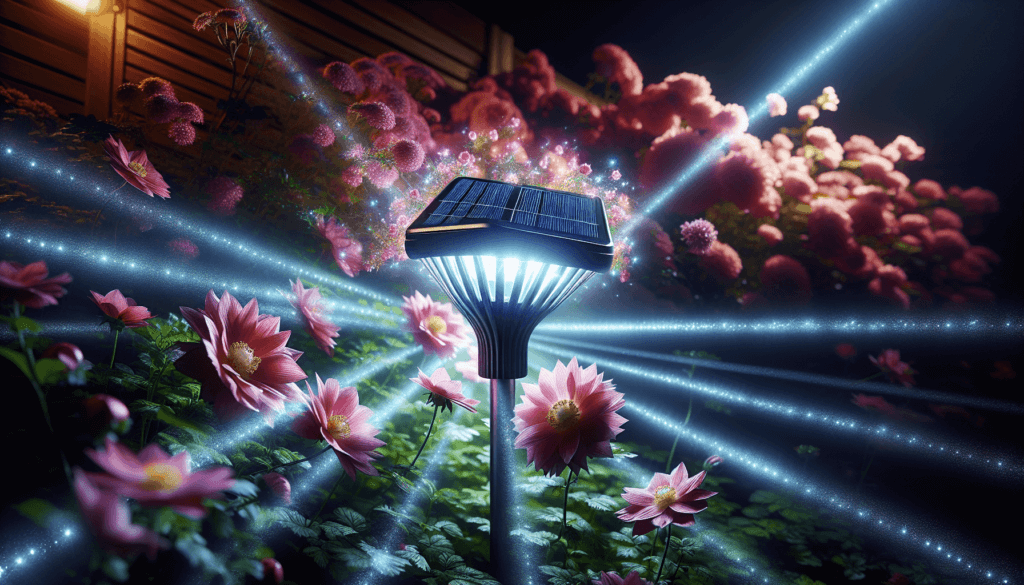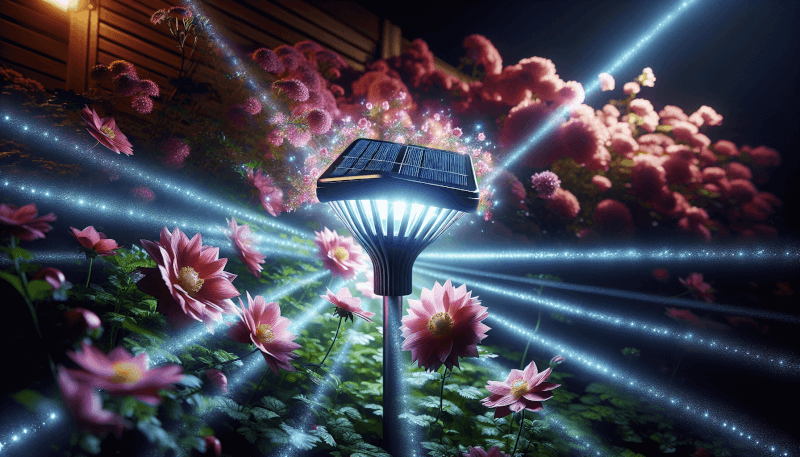Imagine transforming your garden into a magical wonderland with the flickering glow of solar-powered lights that don’t drain your electricity bill. Solar batteries for garden lights offer a sustainable and cost-effective solution to illuminate your outdoor space while adding a touch of enchantment. No more fussing with complicated wiring or searching for power outlets – simply harness the power of the sun to bring a warm radiance to your garden, patio, or pathway. Get ready to bask in the beauty of your garden, both day and night, with the convenience and eco-friendliness of solar batteries for garden lights.

Benefits of Using Solar Batteries for Garden Lights
Environmentally Friendly Option
Using solar batteries for garden lights is an environmentally friendly option as it harnesses renewable energy from the sun. By using solar power, you are reducing your carbon footprint and contributing to a cleaner and greener environment. Unlike traditional batteries that rely on fossil fuels, solar batteries do not produce harmful emissions, making them an eco-conscious choice.
Cost-effective Solution
Investing in solar batteries for your garden lights can save you money in the long run. While the initial cost may be higher compared to traditional battery-operated lights, solar batteries will help you cut down on electricity costs as they charge during the day using the sun’s energy. With solar batteries, you can enjoy beautifully lit gardens without worrying about hefty energy bills.
Easy Installation and Maintenance
Installing solar batteries for garden lights is a breeze. You don’t need to worry about complicated wiring or hiring a professional electrician. Simply position the solar panels in a location that receives sufficient sunlight, connect the batteries to the lights, and you’re good to go. Maintenance is also minimal, with only occasional cleaning of the solar panels necessary to ensure optimal performance.
Increased Safety
Solar batteries for garden lights are a safer alternative compared to traditional battery-operated lights. Since they don’t require wiring or electricity connections, there is no risk of electrical shocks or short circuits. This makes them ideal for households with children or pets, providing a safe and worry-free outdoor lighting option.
Factors to Consider when Choosing Solar Batteries for Garden Lights
Battery Capacity
When choosing solar batteries for your garden lights, it’s important to consider the battery capacity. The capacity determines how long the batteries can power your lights at night. Assess your lighting needs and select batteries with sufficient capacity to provide the desired runtime. A higher capacity battery will ensure your lights stay illuminated for longer, even during cloudy or low sunlight periods.
Rechargeable and Replaceable Batteries
Look for solar batteries that are rechargeable and replaceable. Rechargeable batteries allow you to harness and store solar energy during the day, ensuring your lights stay powered throughout the night. Additionally, having replaceable batteries makes it convenient to swap out old or degraded batteries, extending the lifespan of your garden lights.
Weather Resistance
Garden lights are exposed to outdoor elements, so it’s crucial to choose solar batteries that are weather resistant. Whether it’s rain, snow, or extreme temperatures, opt for batteries that can withstand these conditions without compromising performance or safety. Weather-resistant batteries will keep your garden lights shining brightly all year round, regardless of the weather outside.
Compatible with Garden Light Design
Consider the compatibility of the solar batteries with the design of your garden lights. Some batteries are specifically designed for certain light models or brands, so it’s essential to check the specifications and ensure they are a suitable match. Compatibility ensures optimal performance and longevity of both the batteries and the garden lights.
Types of Solar Batteries for Garden Lights
Nickel Cadmium (NiCD) Batteries
NiCD batteries have been a popular choice for garden lights for a long time. They are known for their durability, ability to withstand extreme temperatures, and high capacity. NiCD batteries are especially well-suited for garden lights that require high energy output or extended runtime. However, they are prone to memory effect and have a lower energy density compared to other types of solar batteries.
Nickel Metal Hydride (NiMH) Batteries
NiMH batteries are another common choice for garden lights. They have a higher energy density than NiCD batteries, offering longer runtimes and more efficient energy storage. NiMH batteries are also eco-friendly and free of toxic metals like cadmium. They perform well in low temperatures and have a longer lifespan. However, they do have a slightly lower capacity than NiCD batteries.
Lithium-ion (Li-ion) Batteries
Lithium-ion batteries are a newer and increasingly popular option for garden lights. They have a higher energy density, allowing for longer runtimes and more efficient energy storage. Li-ion batteries also have a longer lifespan compared to NiCD and NiMH batteries and are less prone to memory effect. They are lightweight, making them easier to handle and install. However, they can be more expensive than other types of solar batteries.
Comparing the Different Solar Batteries
NiCD Batteries
NiCD batteries are known for their durability and high capacity, making them suitable for high-energy output garden lights. However, they are prone to memory effect and have a lower energy density compared to other types of solar batteries. They may also have a shorter overall lifespan.
NiMH Batteries
NiMH batteries have a higher energy density than NiCD batteries, offering longer runtimes and more efficient energy storage. They are eco-friendly and perform well in low temperatures. However, they have a slightly lower capacity compared to NiCD batteries.
Li-ion Batteries
Li-ion batteries have the highest energy density among the three types, providing longer runtimes and efficient energy storage. They have a longer lifespan compared to NiCD and NiMH batteries and are less prone to memory effect. However, they can be more expensive upfront.

Tips for Maximizing the Efficiency and Lifespan of Solar Batteries
Optimal Placement of Solar Panels
To maximize the efficiency of your solar batteries, ensure that the solar panels are positioned in an area that receives ample sunlight throughout the day. Avoid shading from trees, buildings, or other structures that may hinder the collection of solar energy. Regularly clean the solar panels to remove dust or debris that may obstruct sunlight absorption.
Regular Cleaning and Maintenance
Proper cleaning and maintenance of your solar batteries and garden lights are essential for their longevity. Regularly inspect and clean the solar panels to remove dirt or grime that can affect their efficiency. Check the batteries and electrical connections for any signs of corrosion or damage. Replace faulty components promptly to ensure optimal performance.
Avoid Overcharging and Over Discharging
Overcharging or over discharging your solar batteries can negatively impact their lifespan and performance. Ensure that your garden lights have a built-in charge controller or use an external charge controller to prevent overcharging. Similarly, avoid deep discharging the batteries by ensuring they are not drained completely before recharging. This will help preserve the battery’s capacity and prolong its lifespan.
Replacing and Recycling Solar Batteries
Signs of Battery Replacement
Over time, solar batteries may degrade and require replacement. Signs that indicate the need for battery replacement include significantly reduced runtime, decreased brightness of the lights, or if the batteries fail to hold a charge. If you notice any of these signs, it’s time to replace the batteries to maintain optimal performance.
Proper Disposal and Recycling Methods
When it comes to replacing solar batteries, it’s important to dispose of the old batteries properly. Most solar batteries contain hazardous materials, so it’s essential to recycle them according to local regulations. Check with your local waste management authority for specific instructions on how to dispose of or recycle solar batteries in your area.
Solar Battery Charging in Different Weather Conditions
Sunny Days
On sunny days, solar batteries for garden lights charge to their full capacity, ensuring maximum runtime at night. The abundance of sunlight allows for efficient energy conversion and storage. Take advantage of sunny days to charge your batteries fully and enjoy extended periods of beautifully illuminated gardens at night.
Cloudy or Overcast Days
Even on cloudy or overcast days, solar batteries can still charge to a certain extent. While the charging may be slower compared to sunny days, the batteries can still accumulate enough energy to power your garden lights during the evening. It’s important to note that the runtime may be shorter on cloudy days, so adjusting the lighting settings or using energy-saving modes can help conserve battery power.
Winter or Low Sunlight Conditions
During winter or periods of low sunlight, solar batteries may face challenges in charging to their full capacity. The limited sunlight exposure requires adjustments to optimize energy usage. Consider reducing the brightness or using motion sensors to conserve energy. Additionally, be patient during winter as the charging process may take longer than usual due to less sunlight available.
Potential Issues with Solar Batteries for Garden Lights
Inconsistent Performance
Inconsistent performance can occur if the solar panels are not positioned correctly or if there are issues with the battery or electrical connections. Ensure that the solar panels receive sufficient sunlight and regularly inspect the components for any damage or wear. Addressing these issues promptly can help maintain consistent performance.
Limited Battery Lifespan
Solar batteries, like any other rechargeable battery, have a limited lifespan. Depending on the type and quality of the battery, it may last between 1 to 5 years. Frequent charging and discharging, exposure to extreme weather conditions, or improper maintenance can shorten the battery’s lifespan. Regularly monitor the performance and assess the battery’s condition to determine if replacement is necessary.
Reduced Efficiency in Shade
Solar batteries rely on sunlight to charge efficiently, so shading from trees, buildings, or other obstructions can reduce their efficiency. Make sure to position the solar panels in an area that receives optimal sunlight exposure throughout the day. Regularly trim tree branches or remove any objects that cast shadows on the panels to ensure maximum efficiency.
Maintaining and Troubleshooting Garden Lights with Solar Batteries
Cleaning Solar Panels
Regularly clean the solar panels of your garden lights to remove dirt, dust, or debris that can obstruct sunlight absorption. Use a soft cloth or sponge and a gentle cleaning solution to wipe down the panels. Avoid using abrasive materials or harsh chemicals that can damage the panels.
Replacing Faulty Components
If you encounter any issues with your garden lights, such as dimming or flickering, first check the components for any faults. Inspect the batteries, wiring, or light fixtures for any signs of damage or corrosion. Replace any faulty components to restore the optimal functionality of your garden lights.
Checking Electrical Connections
Ensure that all electrical connections are securely attached and free from corrosion. Loose or corroded connections can result in poor performance or complete failure of your garden lights. Periodically inspect the connections and clean them if necessary. Tighten any loose connections to ensure proper electrical flow.
Enhancing the Aesthetic Appeal of Garden Lights with Solar Batteries
Choosing Stylish and Weather-resistant Designs
When selecting garden lights with solar batteries, consider the design and style that complements your outdoor space. Choose lights that match your aesthetic preferences while also being weather-resistant. Look for materials like stainless steel or durable plastics that can withstand outdoor elements and provide long-lasting beauty.
Selecting Warm or Cool White Light
The color temperature of your garden lights can greatly impact the ambiance of your outdoor space. Warm white light creates a cozy and inviting atmosphere, while cool white light offers a more modern and contemporary feel. Consider the mood you want to create and select the appropriate color temperature to enhance the beauty of your garden.
Utilizing Colored or Decorative Lights
For a touch of creativity and personalization, consider incorporating colored or decorative lights into your garden. Solar batteries power a variety of options, from multicolored string lights to unique-shaped lanterns. Express your style and create a captivating visual display by strategically placing these lights amidst your plants and walkways.


